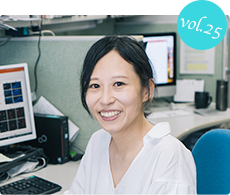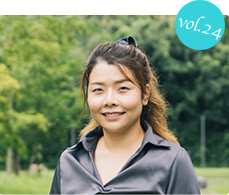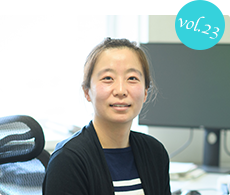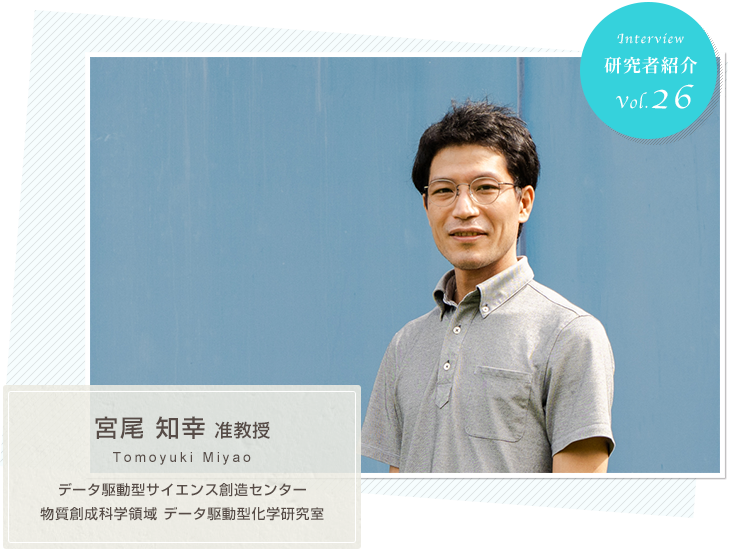
![]()
After completing his master's degree in engineering at the University of Tokyo in 2010, he worked at DIAM Asset Management (now Asset Management One) before completing his Ph. In 2018, he became an Associate Professor at the Center for Data-Driven Science, Nara Institute of Science and Technology (NAIST), where he has been working since then.。
Why did you become a researcher?
When I was in junior high school and high school, I never thought of becoming a researcher. I was so absorbed in playing soccer that it never crossed my mind. Even after entering university, I never really thought about becoming a researcher.
I am from Gifu Prefecture, but I went to a high school that offered enthusiastic guidance for university entrance exams, so I followed the trend and entered the University of Tokyo. In my third year, I was assigned to Professor Kimito Funatsu's laboratory, where I continued on to a master's degree program.
After I received my master's degree in 2010, I found a job at an asset management company in the humanities, and after working there for three years, I returned to Professor Funatsu's lab as a doctoral student. I left the company because, after much consideration, I thought that natural science, with its solid causal relationships, would make more sense as a field for me to work on in the future.
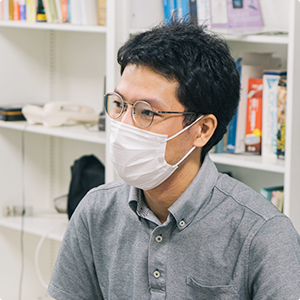
In the world of finance, we use financial engineering and mathematical models to estimate risk, decide where to invest, and when we lose money as a result, we reflect on what happened because we made these calculations and took these actions, but it has probably always been a repetitive process. I think this is especially true when I joined the company at a time when the subprime loan problem was becoming apparent. I think the world of finance is interesting for those who enjoy the dynamic nature of handling a lot of money and being on the cutting edge of the economy. However, I found the repetition hard and disturbing. In that respect, natural science has a margin of error, but if you do the same experiment under the same conditions, you will get almost the same results. In other words, it is reproducible. I thought that this would be more refreshing for me and that I would be better suited to it. Even now, my former bosses at my former company are good friends of mine. It was very good that I had the opportunity to work for a company and study all the common sense as a member of society.
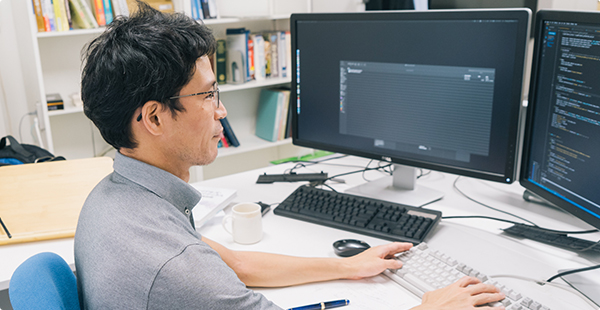
I entered the doctoral program in October 2013 and received my degree in September 2016, during which I studied abroad in Switzerland for a year. I wanted to do research under Prof. Gisbert Schneider (ETH Zurich), who has achieved results in the field of chemical information targeting drug discovery, and Prof. Funatsu introduced me to him. I enjoyed my one year in Switzerland. During this time I got married to my current wife who was in Japan.
After obtaining my PhD, I started working as a postdoc under Prof. Jürgen Bajorath (Bonn University) in October 2016, and when he introduced me to a faculty opening at the University's Center for the Creation of Data-Driven Science, I applied, was hired, and started my position in April 2018. Because of this, I did not become a researcher to become a researcher. I just kept doing what I liked, what I enjoyed, and what made sense to me, and I became a researcher.
Currently, I am conducting research to solve problems related to prediction and design in chemistry and chemical engineering through data analysis using cheminformatics (chemical informatics) as a weapon. I am not sure if there is really a causal relationship between events, but I try to make discoveries that lead to causal relationships as much as possible in my research.
Balancing research and raising children
Currently, I have four working students in the doctoral program, two regular students, and six students in the master's program, and I am almost single-handedly taking care of them. The ratio of education to research is about 4 for education, 4 for joint research, 1 for my own research, and 1 for other miscellaneous work. In joint research, I take on themes that cannot be handed over to students, such as those that are difficult to write papers on, and when I am asked to "analyze here" or "create code," I have to do it myself, which takes time. I regret that I don't have time to do my own research.

Children are cute and most importantly, they are important. If I didn't have children, I would have a little more time. But if I had children, it is inevitable that I would have less time. Usually, having a child reduces the efficiency of work. I think the hardest thing about having children is not being able to be alone when you want to be alone. If you say that having children encourages you and improves your work efficiency, you probably have very strong support. You have a partner who is a full-time housewife, or you live with your parents. If you are a normal co-worker, for example, like me, you have to pick up your child from daycare at 5:30 p.m. Then you have to stop work in the middle of the day. Then I would have to stop work in the middle of the day. I mainly use computers for data analysis, so I can do that anywhere. If I were doing experimental research, I would have to schedule my work around the time I pick up my children from daycare, which would be extremely difficult.
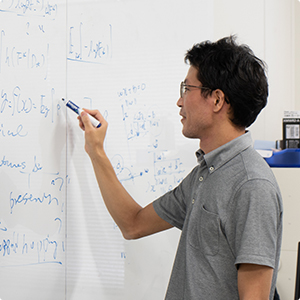
Daily Schedule
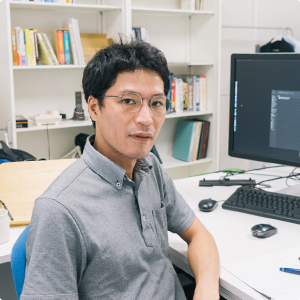
My wife is in charge of taking the children to and from daycare in the morning, partly because they often say "I'm going with my mom. I want to work in the morning, so I come to the lab at 5:00 a.m. when I am early. I am acquainted with the person doing the cleaning. Students don't arrive until after 10:00 a.m., so I concentrate on my work during this time. I think this style is probably the most efficient. However, with the Corona Disaster, I sometimes have online meetings at night, which makes it more difficult to get up in the morning. The downside of being online is that I can schedule anywhere.
In the evenings, I am usually home by 5:30 p.m. on days when I am in charge of picking up the children from daycare, and by 7 p.m. on days when I don't have to pick them up. My wife makes dinner and I bathe the children. My wife does nine of the housework and I do one of the childcare, and we divide the childcare responsibilities seven to three. We have never had any disputes about the division of responsibilities. This may be due to the fact that my wife is the type of person who prefers to complete housework by herself.
On weekends, I spend time with the children. I can't do any research on Saturdays and Sundays. Before my child was born, I used to work all the time, regardless of holidays.
My way to refresh myself is to go running these days. I run once a week on either Saturday or Sunday. I feel refreshed when I move my body. When I take the children to the park on Saturdays and Sundays, my wife can be alone for about three hours, so I think that is when she refreshes herself.
Also, my parents in Gifu come to help us quite often. When my child had just started nursery school, they helped me all the time. Recently, they have been coming once every two weeks on weekdays to help me because my child has been vaccinated twice. On the days when they help, my wife and I can work as much as we want without worrying about picking up our child from daycare.
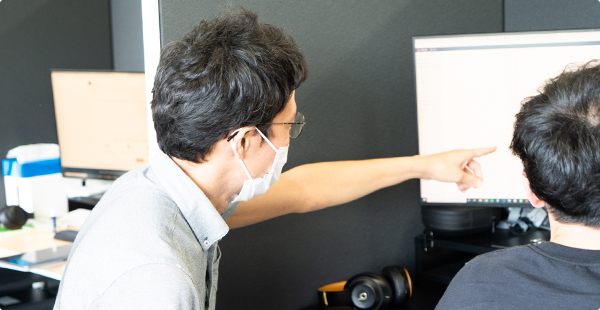
Research Environment and Challenges at NAIST
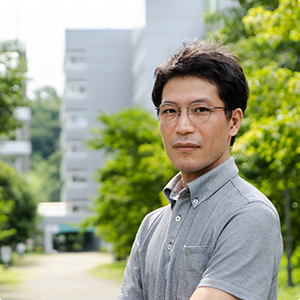
I feel that Japanese society is not designed for full-time working families. What has been troubling me recently is the heavy rain warnings. I live in Nara City, and the nursery schools in Nara City will not accept children if there is a heavy rain warning. Yesterday (July 15, 2021), another heavy rain warning was issued and the daycare center was closed, so I stayed home in the morning using my telecommuting service. Eventually, it was lifted around 9:00 a.m. and I received a call from the daycare that they would accept my child, so I was able to leave him with them and come out to the university. My wife is in an industry that requires her to travel a lot, and this kind of unforeseen situation is very troubling. This time I was able to work from home with Corona Reasons, but it would not be possible if, for example, it was my class day and my wife had a business trip. Not everyone can choose to work from home. When there is a warning, elementary schools are closed, and people raising children in the early elementary grades may be in trouble. I would like you to do something about the problem of nursery schools and elementary schools closing due to heavy rain warnings.
The research environment at our university is very comfortable. There is an open atmosphere where professors from various fields can freely express their opinions without any hierarchical relationship. I think it is a good place. I am practically the only one running this laboratory, and it is a challenge that I am not able to carry out my own research as much as I would like, but other than that, I think things are fine as they are.
(July 2021)

-
2021.8 updated
Division of Biological Science
-
2021.8 updated
Division of Materials Science
-
2021.3 updated
Division of Information Science






